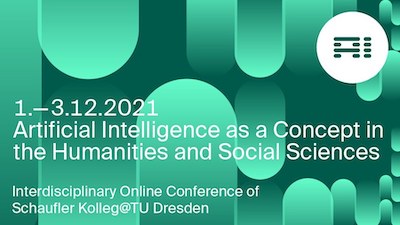1.-3 December 2021
TU Dresden
→ Website
The first conference of the Schaufler Kolleg@TUD aims to focus on the analytical question of appropriate humanities and social science terms and concepts of artificial intelligence in order to complement the current debates on the social, political as well as cultural effects of the use of AI technologies. In contrast to approaches that discuss mechanisms of reproduction and reinforcement of existing social inequalities and forms of discrimination, examine the fragmenting and polarizing political tendencies in public spaces, or analyze the restriction of individual autonomy of action through the implementation of AI procedures in various spheres of life, the conference seeks to foster an interdisciplinary exchange on terms and concepts in order to ground a better understanding of AI as a real phenomenon.
We aim to complement theoretical approaches that seek to understand the adaptive algorithmic processing of information, the data-shaped extraction of knowledge, and its resulting patterns. To this end, we would like to address the following questions: Which concepts are well-suited for a better understanding of AI, especially with regard to its complex embeddedness in social and cultural realities? How can we work on a common language toward a shared understanding of AI? Which bodies of knowledge can be adopted as a source of inspiration and which concepts are better discarded altogether? Further interdisciplinary investigations into current theoretical approaches seem crucial and like a productive task in order to achieve a deeper analytical understanding of AI as an empirical object of study.
Programm
Mittwoch 1.12.2021
14:30-15:00 Einführung & Begrüßung
Lutz Hagen (Sprecher Schaufler Lab@TU Dresden) & die Organisator:innen der Tagung
15:00-16.30 Panel 1: Sozialität mit Maschinen
Verteilte Intelligenz: Künstliche Intelligenz als Adressierungs- & Operationsproblem Jan Tobias Fuhrmann (Carl von Ossietzky Universität Oldenburg)
Verschaltungsintensität. Von der Autarkie zur Relationalität von Intelligenz im Feld der Robotik Hannah Link (Johannes-Gutenberg-Universität Mainz)
Mensch & Maschine in Relation. Überlegungen zur relationalen Ontogenese neuer Identitäten Jonathan Harth & Maximilian Locher (Universität Witten/Herdecke)
Moderation: Ann-Kristin Kühnen (TUD)
16:45-18:15 Panel 2: Technopoetologien
„If I say the word out loud, it will be more real“ – Anmerkungen zu Selbstgesprächen mit KI Jakob Claus (Carl von Ossietzky Universität Oldenburg) & Yannick Schütte (Universität Potsdam)
Adversarial Poetry – Subversive Einbettungen im künstlich neuronalen Wortraum Christian Heck (Kunsthochschule für Medien Köln)
Technopoetics of the Broken Machine Sara Morais dos Santos Bruss (TUD)
Moderation: Carsten Junker (TUD)
19:00 Keynote 1: Artificial Communication
Elena Esposito (Universität Bielefeld/Universität Modena und Reggio Emilia)
Moderation: Dominik Schrage (TUD)
Die Keynote findet virtuell & in Präsenz statt:
Hörsaal Görges-Bau/Raum 226, Helmholtzstr. 9 in 01069 Dresden (3G-Regel)
Donnerstag 2.12.2021
14:00-15:30 Panel 3: Embedded Normativities
Justification by Similarity
Christoph Merdes (Friedrich-Alexander-Universität Erlangen-Nürnberg)
Impugning credibility: The concept of testimony in automated decision-making
Catriona Gray (University of Bath)
Strengthening algorithmic legitimacy through democratic design?
Rita Jordan (ScaDS.AI Dresden/Leipzig)
Moderation: Luise Müller (Universität Hamburg)
15:45-17:00 Panel 4: Historizität & Historisierungen
Von der AI zur KI: Historisieren statt Definieren
Florian Müller, Dinah Pfau, Helen Piel, Rudolf Seising & Jakob Tschandl
(Forschungsinstitut für Technik- & Wissenschaftsgeschichte des Deutschen Museums, München)
„Das Umstrittensein eines unglücklich gewählten Begriffs wird wohl noch einige Zeit zum Bild der KI gehören”
– Anmerkungen zur Begriffsgeschichte der Künstlichen Intelligenz
Susanne Schregel (Universität zu Köln)
Moderation: Rebekka Roschy (Schaufler Kolleg@TU Dresden)
17:30-19:00 Panel 5: Ästhetiken maschineller Intelligenz
The Aesthetics of Adversarial Examples
Fabian Offert (UC Santa Barbara)
…from the Inside of the Watch. KI als Anlass künstlerischer Arbeit
Michael Klipphahn (Schaufler Kolleg@TU Dresden)
Composing AI. Ausdrucksform, Ideenpool & Vision
Miriam Akkermann (TUD)
Moderation: Kerstin Schankweiler (TUD)
19:15-20:30 Virtuelle Ausstellungsführung
Rundgang durch die Doppelausstellung „A & I“ in der Altana Galerie der TUD mit Werken der Künstler der Schaufler Residency@TU Dresden 2020 & 2021. Christian Kosmas Mayer & Anton Ginzburg & anschließendes Künstlergespräch. Führung & Moderation: Gwendolin Kremer (TUD)
Freitag 3.12.2021
12:30-13:45 Panel 6: Prädiktion & Zukünfte
Synchronisation & Inkommensurabilität: Ko-Konstruktion der Zukunft zwischen Subjekt & prädiktiven Algorithmen aus praxistheoretischer Perspektive
Ingmar Mundt (Universität Passau)
Eine Bewertungsvorhersage ist keine Bewertung: Die Grenzen des E-Raters
Jan Georg Schneider (Universität Koblenz-Landau) & Katharina Zweig (TU Kaiserslautern)
Moderation: Susann Wagenknecht (TUD)
14:00-15:30 Panel 7: Automated Sense-Making
The Total Modeling of Meaning: The Logic of Sense in AI
Claire Y. Song (New York University)
BERT, GPT-3, Timnit Gebru, and us. The AI Conquest of Language
Jonathan Roberge & Tom Lebrun (INRS Quebec/Montreal)
Forming pragmatic pattern to shape Human-Machine Communication
Yaoli Du (Universität Leipzig) & Nadine Schumann (InfAI Leipzig)
Moderation: Simon Meier-Vieracker (TUD)
16:00-17:15 Panel 8: Spatial Topologies of AI
Cosmological shifts and artificial intelligence: The geopolitical consequences of the topological turn
Lukáš Likavčan (Center for Audiovisual Studies FAMU, Prag)
Pointless Topology: Figuring Nondoxastic Space in Computation and Cognition
Patricia Reed & AA Cavia (Berlin)
Moderation: Richard Groß (Schaufler Kolleg@TU Dresden)
17:30 Keynote 2: What kind of knowledge is machine learning?
For a political epistemology of AI
Matteo Pasquinelli (Hochschule für Gestaltung Karlsruhe)
Moderation: Orit Halpern (Concordia University Montreal)
Kontakt: schaufler.tagung@tu-dresden.de

